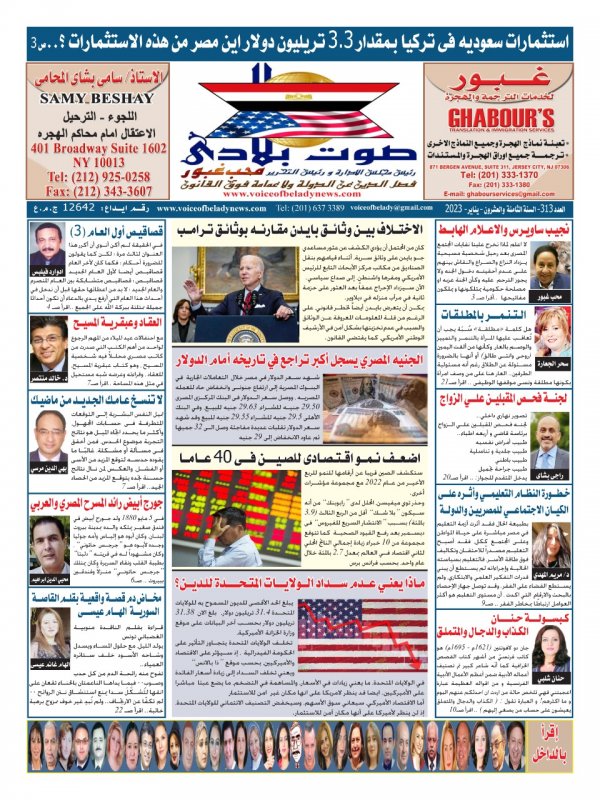Economic sanctions
I wrote
Howayda Awad Ahmed
The method of imposing sanctions is very common in the international community. But in order for this method to have the greatest effectiveness and impact, it must be preceded by a warning to the state that will be punished, not to impose the punishment in a sudden or unexpected way as a retaliatory measure against some of the behaviors issued by it. The warning is formulated in such a way that retracting it is possible in the event the State to which the warning is directed acquiesces in a manner that satisfies the demands of the State that submitted it.
Examples of common sanctions in international relations include hostile propaganda, political support for the enemies of the state on which punishment is imposed, imposition of immigration, trade, transport and economic sanctions.
Economic sanctions fall under Chapter VII of the Charter of the United Nations. Their approval is a substantive act, not a procedural action that requires the approval of the majority and the non-objection of any of the five permanent states to them. Therefore, the vote of the Council’s majority to impose sanctions and the non-objection of any of the permanent states to them was a de facto matter with a more political face. From being a judicial ruling, necessitated by the rules of justice and law.
The idea of sanctions is not new, it is as old as society, and since the commercial threat imposed by the Greek leader Pericles on the neighboring state of Megara in about 342 BC was the idea of sanctions.
In response to Megara's attempt to expropriate some land and kidnap three women.
In 1812, the United States imposed an embargo on Great Britain in response to the British attempts to limit America's trade with France, and in 1917 President Wilson imposed a ban on the sale of iron, steel and other materials that served the war effort to Japan.
President Roosevelt also imposed economic sanctions on Japan in 1940
However, we live in an era characterized by increasing global economic integration and growing interdependence. Most countries derive their prosperity and even derive their strength from the increasing participation in the international economy.
In such a world, sanctions are an important and effective tool, albeit beset with problems, to impose the application of international values and standards of conduct and mediation, not only between different countries, but also with regard to the relationship between specific countries and their citizens.
Sanctions are also a tool with actual costs as well as potential benefits.
The number of times sanctions have been resorted to has increased dramatically, especially since 1990. The United States has used the penalty to serve foreign policy goals 155 times since World War I, 104 times since World War II, and according to the number mentioned by the Presidential Council for Export 61 times since 1993.
Accordingly, more than half of the number of sanctions imposed in the past 80 years have been imposed in recent years
The UN Security Council imposed sanctions twice between 1945 and 1990 on Rhodesia and South Africa.
But since 1990, the United Nations has imposed binding sanctions on eight countries, namely Iraq, for its invasion of Kuwait, and Serbia for its use of force in the Republic of Yugoslavia.
Previously, Libya in response to the Lockerbie case on its flight No. 103, Somalia and Liberia because of the civil war that broke out in them.
And Rwanda because of the mass massacres there, and Haiti because of its disruption of democracy. Angola during the renewed rebellion. Sanctions were also imposed on the revolutionary group in Sierra Leone.
Economic sanctions are threats or execution. When rewards are given publicly and on a large scale, they are referred to as foreign aid, and when sanctions are imposed in the same way, they are referred to as economic sanctions.
When the management of the state's economic affairs is exercised at a lower rate of noise, it is appropriate to describe it in terms of economic pressures, whether they are rewards or economic sanctions or a combination of both.
Hence, economic sanctions are only one string in the arc of the art of managing the economic affairs of the state and are not necessarily the most important strings, but despite that, they are often used in crises, and they have provoked more controversy in the recent period than other forms of the art of managing state affairs.
Economic sanctions usually include a comprehensive and selective cessation of commercial and financial relations between the subject of the sanctions and his victim. Trade sanctions may include a refusal to sell some or all of the goods that the victim wants.
Especially strategic commodities such as weapons and complex technical equipment or fuel or basic food commodities such as grains or closing markets in the face of some or all of its exports. At a less severe level, it may include an increase in the customs tariff on its exports or a reduction in the quantity allowed for export.
It may include a ban on dealing with companies that deal with the target country, the black list, etc. In order to impose a program of trade sanctions, a naval blockade may be resorted to on the target country.
Although this may raise the degree of risk through the possibility of a clash between the conflicting fleets.
Financial sanctions may include halting development operations and freezing financial assets that may be incurred
The sacrifice has missed the foreseeable vision of withdrawing it from the banks controlled by the imposing state and confiscating property
And the imposition of a ban on new financial investments, the collection of profits, and the cessation of aid.
Although economic sanctions are not a phenomenon of the entire twentieth century, they have been resorted to since the First World War in support of a wide sector
of foreign policy objectives
Initially, it was used with the aim of strengthening a military action taken as happened with the League of Nations or in an attempt to prevent a military attack, but since the Second World War and then resorting to it in order to weaken the military capabilities of the opponents, such as the strategic danger imposed by the Atlantic Alliance against the Soviet Union .. previously.
Communist China in the forties and the destabilization of the governments of small hostile countries, such as the sanctions imposed by Stalin on Yugoslavia .. in the past.
And the repeated embargo imposed by the United States on Cuba...Castro...in the early sixties.
It is true that economic sanctions have rarely been decisive in any major international conflict, but it is illogical to conclude that they are rarely effective in their impact, as many have recently thought, but many are beginning to realize that despite the inability of sanctions to affect conflicts that involve high risks, they may be important if It was used in conflicts as an aid to the use of force, propaganda or diplomacy, especially if the target entity was small and weak.
There is also today a clear confirmation that economic sanctions still represent an effective weapon when used in pursuit of modest political goals, even if they are used alone.
The state imposing the sanctions is making some progress in achieving its goals by using economic sanctions in about half of the cases of changing modest political orientations
It helps that in such cases it is easy to resort to imposing penalties.
It is better to call it economic pressures with less noise, which enables the target country to acquiesce without losing much of its status and dignity.
In the struggle over issues of lower priority, the victim must gain international support.
The successful use of economic pressures in pursuit of relatively modest political goals is of course a common feature of relations between major powers, including major regional powers.
Thus, we now see that US sanctions against Russia are a not easy practice, and that the next scenario depends on the extent of the Russian bear’s tolerance to gradually isolate his country, and that the Ukrainian war will not reap any goal from it except that it is a drain on the capabilities of the Russian people, and that whoever wants to help him, such as China, for example, will not be likely to receive sanctions, and that In the end, he will look for his country's interest with America




 رئيس التحرير يكتب : من التراب وإلى التراب يعود .. تحويل جثث الموتى إلى سماد عضوى
رئيس التحرير يكتب : من التراب وإلى التراب يعود .. تحويل جثث الموتى إلى سماد عضوى
 رئيس التحرير يكتب : لماذا تصر الحكومة على استمرار شريف أبو النجا رئيسا لمستشفى 57357 رغم الشواهد العديدة على فساده
رئيس التحرير يكتب : لماذا تصر الحكومة على استمرار شريف أبو النجا رئيسا لمستشفى 57357 رغم الشواهد العديدة على فساده اقرأ في العدد الجديد ( عدد يناير ٢٠٢٣ ) من جريدة صوت بلادي
اقرأ في العدد الجديد ( عدد يناير ٢٠٢٣ ) من جريدة صوت بلادي









